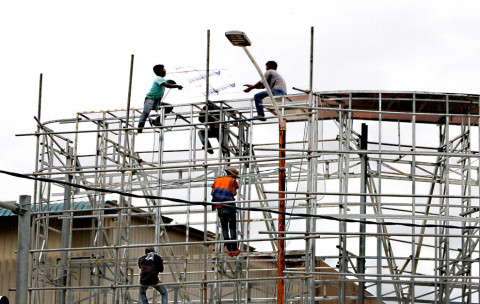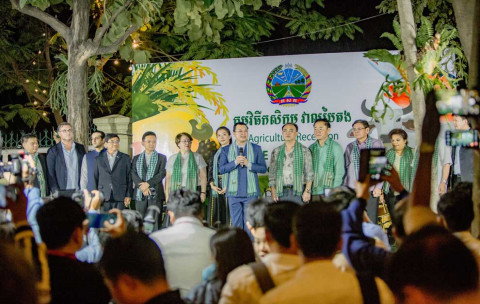
Farmers in Takeo province harvest their rice with the help of agriculture ministry officials in November. MAFF
More than 400 personnel from the Ministry of Agriculture, Forestry and Fisheries and the National Institute of Statistics within the Ministry of Planning are set to embark on a nationwide mission. Their objective is to conduct an extensive data collection initiative covering crop cultivation, livestock and poultry raising, aquaculture and fishing operations.
As announced in a press release on December 10, the survey is slated to commence on December 11, with technical assistance provided by the UN Food and Agriculture Organisation (FAO).
Noting its broader significance, the release said the project aims to cover around 16,000 agricultural holdings nationwide. It added that the survey transcends mere statistical compilation, positioning itself as a pivotal cornerstone for shaping forthcoming agricultural policies and practices.
Todd Hunkin, a statistician for FAO in Cambodia, said the 2023 Cambodia Agriculture Census goes beyond mere data collection; it serves as a crucial instrument for fostering sustainable development and ensuring food security.
“By understanding the nuances of our agricultural practices, challenges and potential, we can tailor strategies that not only boost production but also support our farmers and protect our environment. This survey is a key step in aligning our agricultural practices with the Sustainable Development Goals [SDGs], ensuring a brighter future for Cambodia’s agriculture,” he said.
The press release also said that this initiative, directed at furnishing the nation with high-quality and timely agricultural data, holds significance for making evidence-based decisions to attain SDG 2 – Zero Hunger.
Furnishing comprehensive data, the survey assists in devising effective strategies for agricultural development, ultimately reducing hunger and poverty.
Mak Mony, director of planning and statistics at the agriculture ministry, said Cambodia is entering a transformative era, marked by the inauguration of the new government and the launch of its visionary Pentagonal Strategy.
“As we embrace this era, the significance of data in shaping our future cannot be overstated. The Cambodia Agriculture Census 2023, supported by the FAO through the 50x2030 Initiative, which seeks to improve rural livelihoods and increase food security through the transformation of agricultural data systems, plays a crucial role in this evolution, especially the recently launched priority policy programmes of the seventh government mandate,” he added.
Significantly, week-long training sessions occurred in Phnom Penh from November 20 to 25 to equip all participants with skills and knowledge for data collection. The training aimed to build the capacity of government staff as trainers, who subsequently delivered training to provincial staff.
























